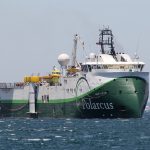Portugal warned of rising offshore wind farm costs
A disastrous investors ‘no show’ at a renewables energy auction in the UK on Friday is sounding alarm bells for the Portuguese government that has invested heavily in its own offshore wind energy policy.
Offshore wind developers stayed away from the UK auction arguing that the price offered by the government did not reflect rising industry costs — a problem that is hampering wind projects globally.
In a 2022 auction, offshore wind projects were the main recipient of funding, with 7 gigawatts (GW) awarded, but developers did not even bid in the latest auction, the results of which were published on Friday.
One of the UK’s projects now seen as unviable by investors is the multimillion euro Norfolk Boreas offshore park designed to provide enough energy to feed 1.5 million homes, will now be shelved because of a 40% increase in prices.
Now a specialist in energy who led EDP Innovation for several years, António Vidigal warns that the UK situation will have an impact for auctions in Portugal.
The failure of the UK auction is closely linked to the fact that a maximum price of €51 per MWh was set by the government regulators for the sale of offshore wind energy and €132 per MWh for offshore floating platforms.
Investors say the amounts are insufficient and unworkable because they were based on 2012 prices before the pressures of inflation, interest rate hikes, and the war in Ukraine affected the cost of financing.
In Portugal, the rules of similar auctions have not been officially set, but the woking group responsible for drawing up a proposal for auctions has recommended a competition for 3.5 GW of power for the first phase of wind farms off the coast of Viana do Castelo, Leixões and Figueira da Foz.
According to a proposal, there is up to a 2 GW capacity to be explored at Viana do Castelo – the place that represents the lion’s share of the 10 GW of power that the government wants to auction off in phases to 2030.
But faced with the disastrous results of the auction in the UK, the increase in interest rates, and inflation in Portugal, specialists are recommending “caution”, even suggesting the possibility that less power should be auctioned than initially expected, for the first phase
António Sarmento, founder of the Wavec Centre for Oceanic Energy Studies told the online news source ECO: “What happened in the UK serves as a lesson for Portugal. It is a double-edged sword: a higher maximum price will be (needed) to whet the appetite of developers and ensure the success of attracting investors for what will be the first offshore eolic auction in Portugal, and that will push up the price of energy for consumers.”










